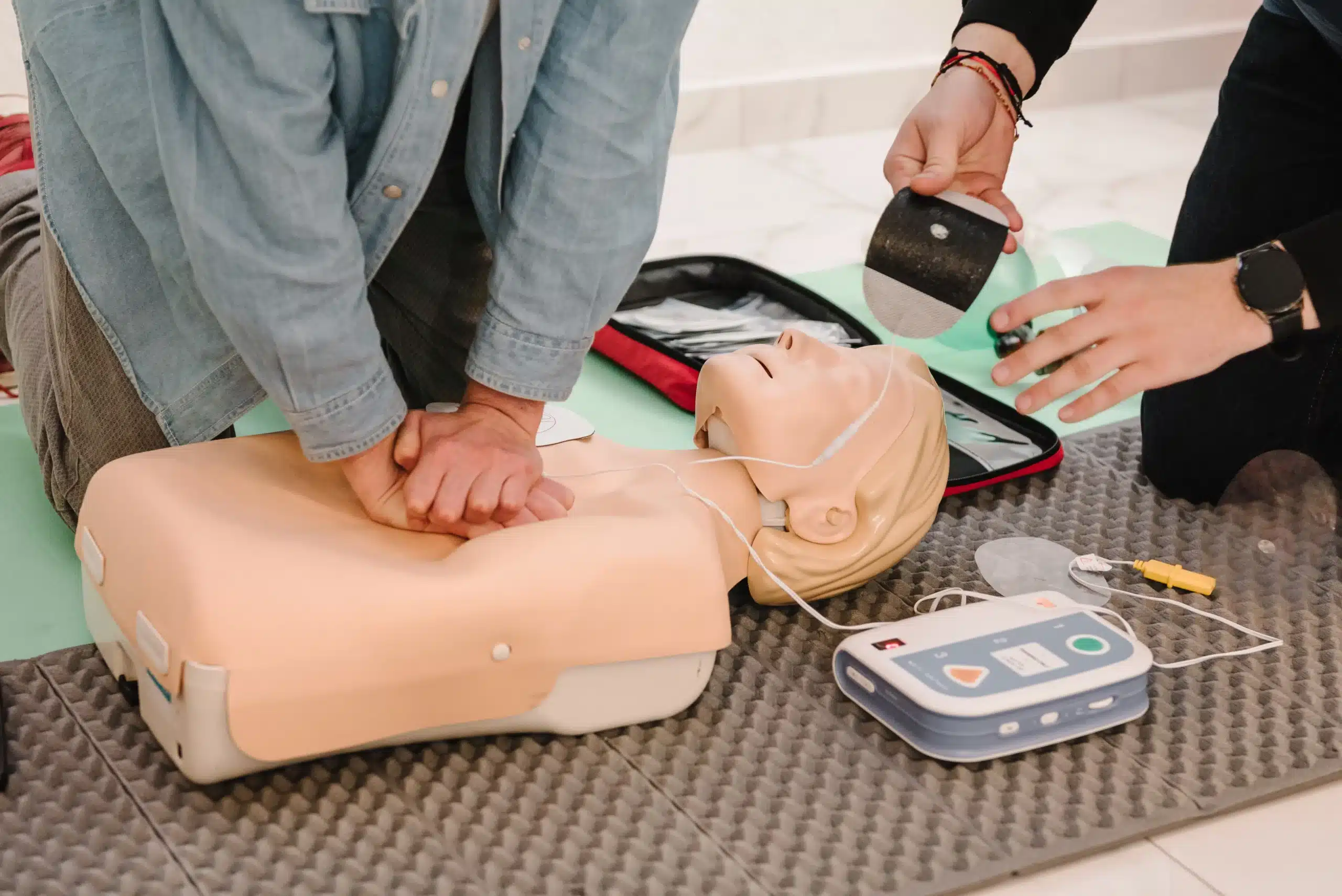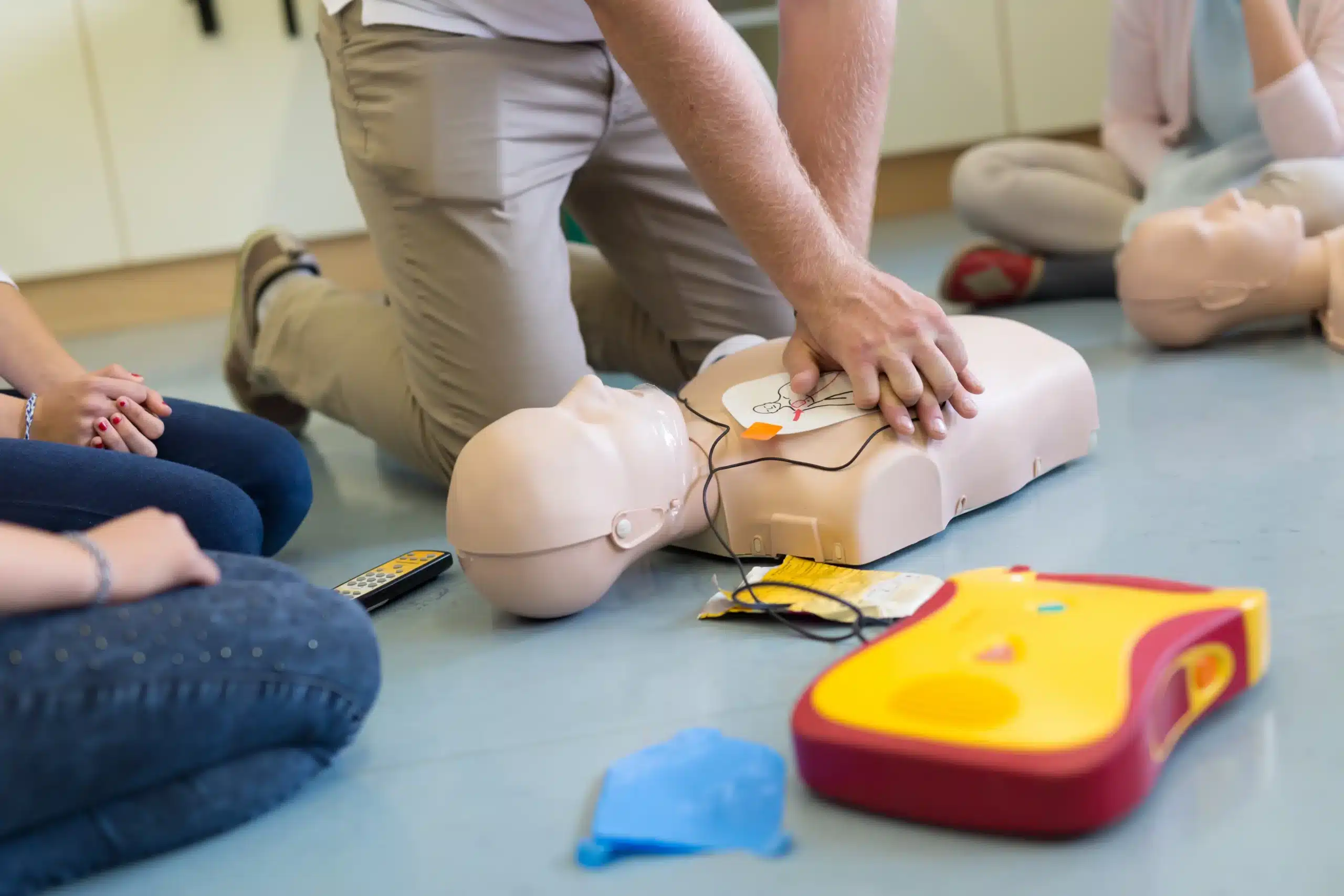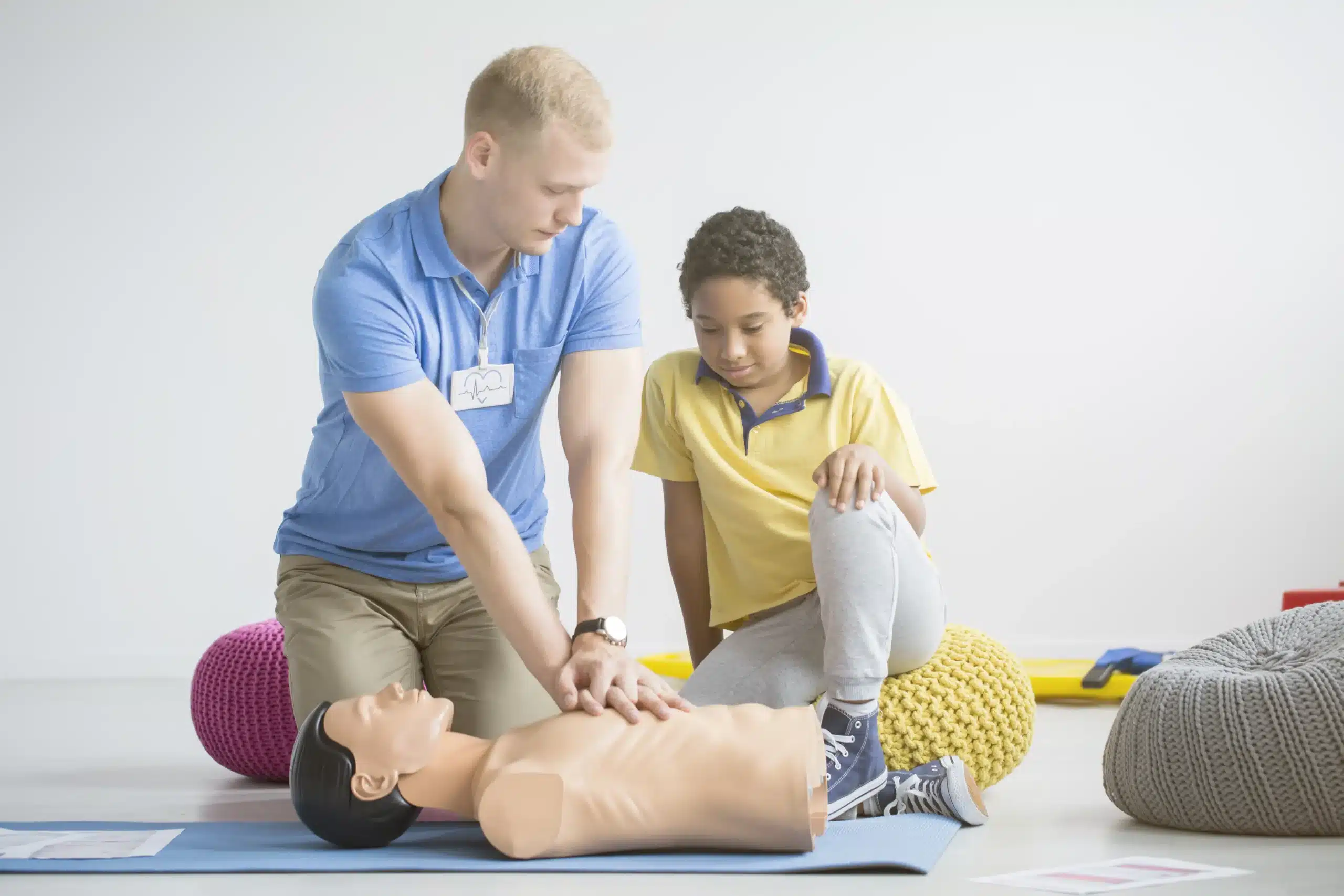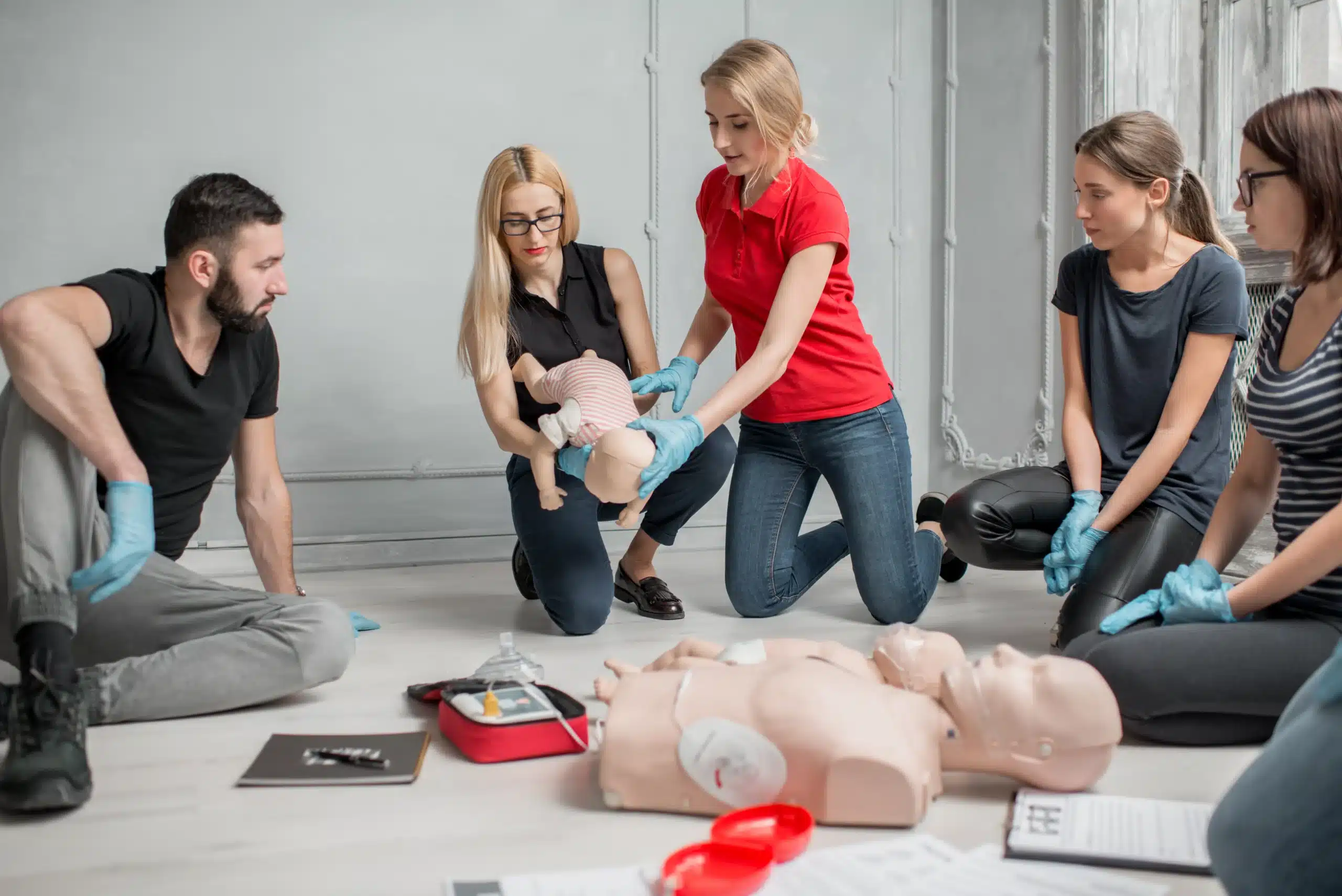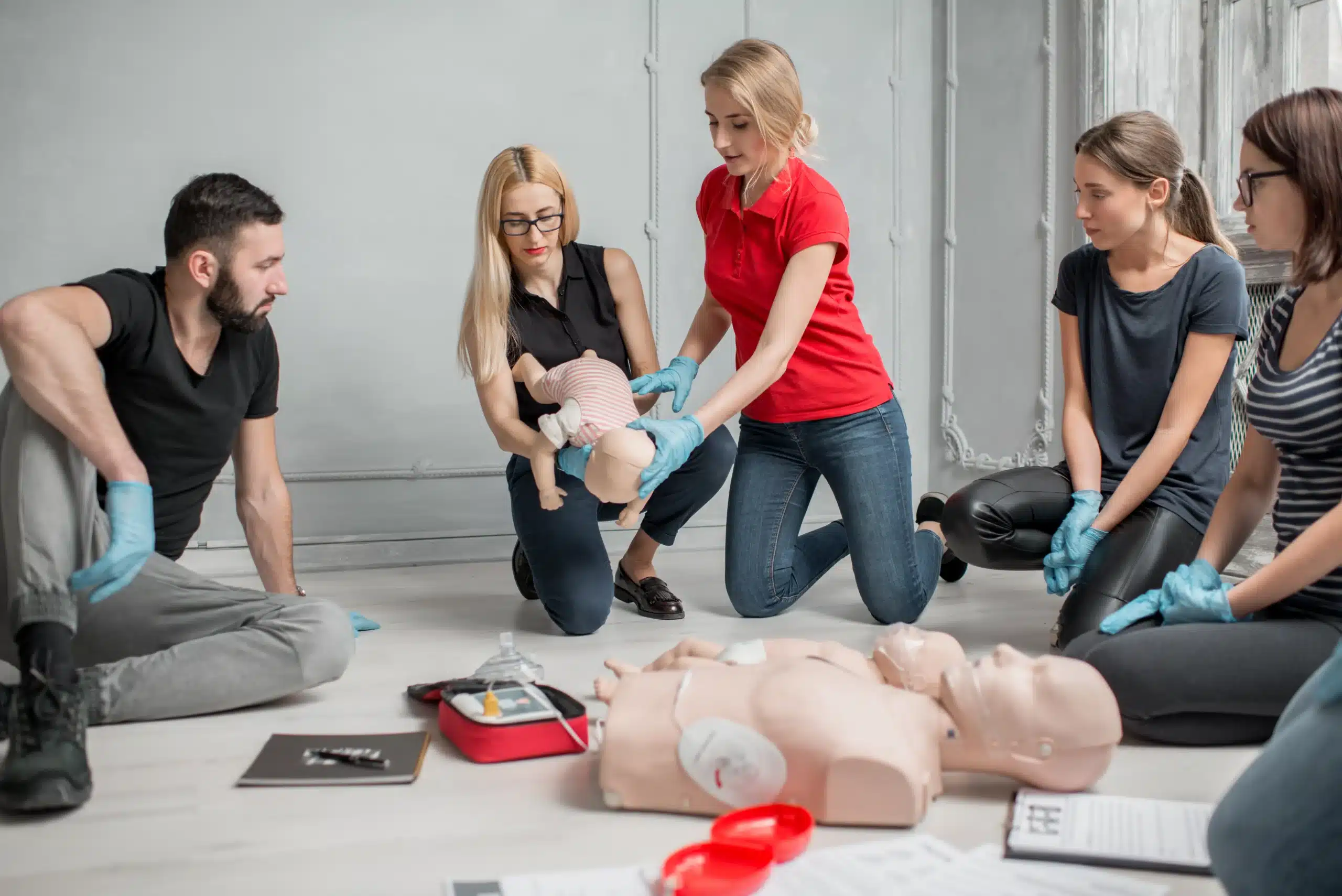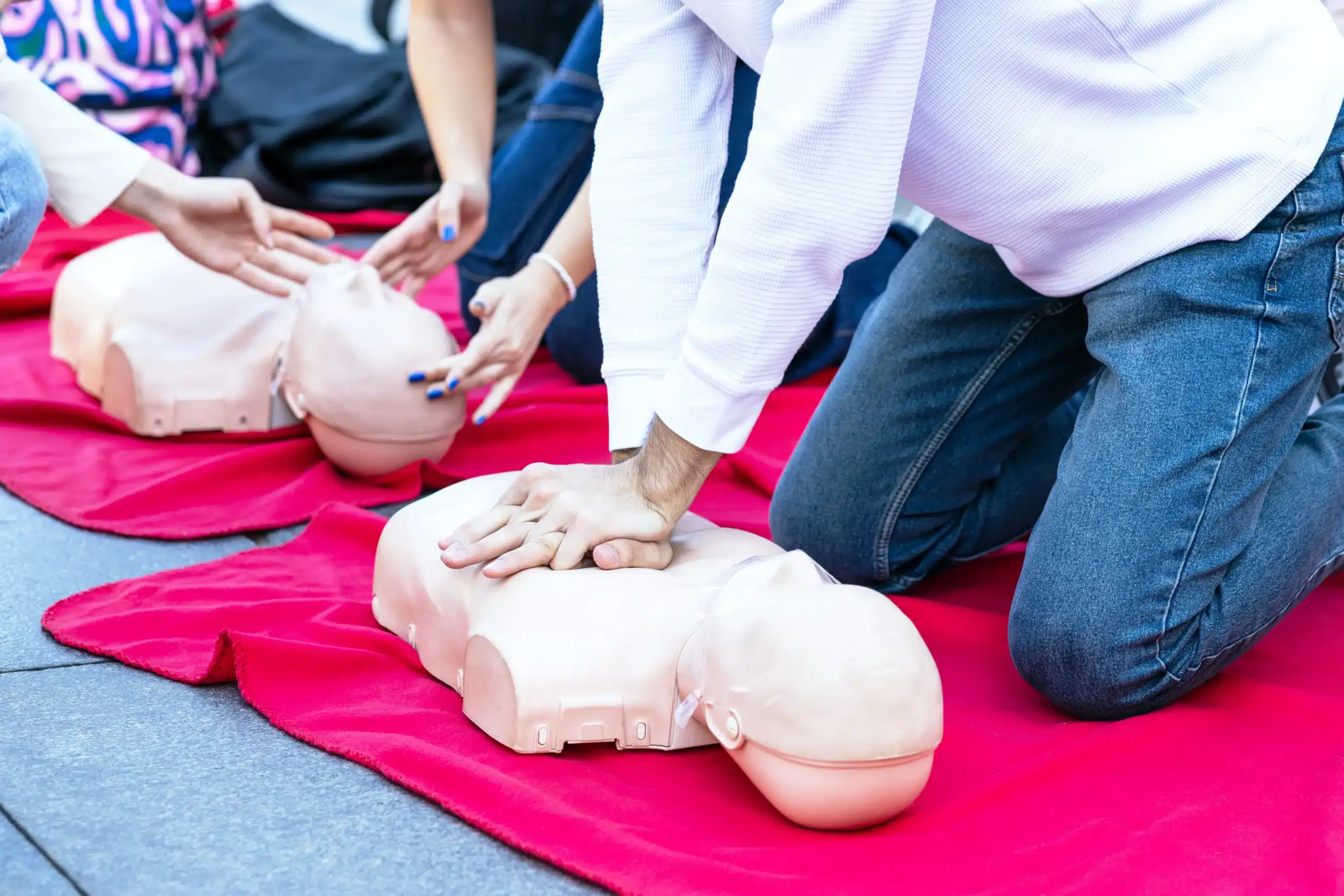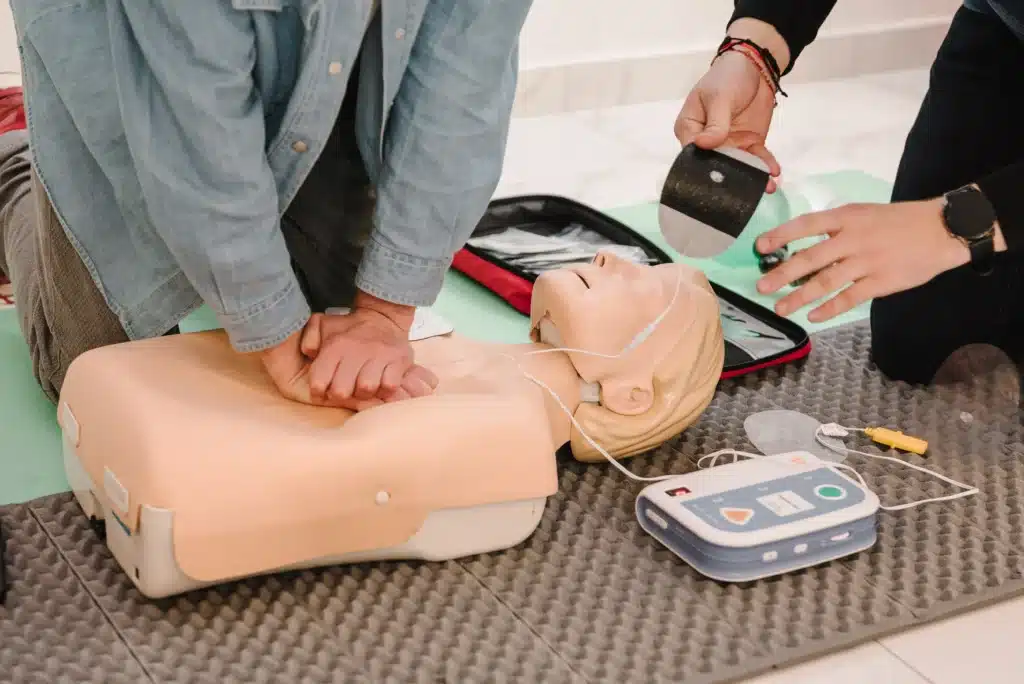Empowering yourself with the ability to respond effectively in emergencies is a gift, not only to yourself but to your community. Online CPR classes in Berkeley provide an accessible and convenient path to acquiring these vital skills. This guide serves as your comprehensive resource for navigating the world of online CPR training. We’ll cover the various types of CPR certifications, the benefits of online learning, and how to choose the right course for your specific needs. We’ll also debunk common myths surrounding online CPR training and provide clear, actionable steps to get certified and stay up-to-date with your skills. Join us as we explore the power of online CPR training and how it can equip you to make a real difference.
Key Takeaways
- Online CPR training offers a flexible, convenient, and often more affordable path to learning essential lifesaving skills: This format allows you to study at your own pace and choose a schedule that works best for you. Just remember that a hands-on skills assessment is typically required for certification.
- Understanding the different CPR certifications (Basic CPR, BLS, ACLS, PALS) is crucial for choosing the right course: Consider your personal or professional needs when selecting a certification level, as each one covers different skills and is designed for specific situations.
- Safety Training Seminars simplifies CPR training in Berkeley with its comprehensive course offerings, flexible schedules, and low price guarantee: They offer various AHA-certified courses and convenient options for individuals and groups in the area.
What are Online CPR Classes?
Online CPR classes offer a flexible way to learn the lifesaving skills of cardiopulmonary resuscitation. Instead of attending a traditional in-person class, you work through the course material online, often at your own pace and on your own schedule. This format makes CPR training accessible to busy professionals, parents, and anyone else who may find it difficult to commit to set class times. While the coursework is completed online, most certifications require an in-person skills assessment to demonstrate your proficiency.
Benefits of Online CPR Training
The biggest draw of online CPR training is the flexibility. You can study the material whenever and wherever it’s convenient. This self-paced learning allows you to absorb the information thoroughly and review sections as needed. Research even suggests that online CPR certification courses can be just as effective as traditional classroom learning. Plus, online courses often come at a lower price point than in-person options, making them a budget-friendly choice.
Available Online CPR Courses
Several organizations offer online CPR courses, including the American Red Cross, the American Heart Association, and independent providers like ProTrainings and the National CPR Foundation. Safety Training Seminars provides a range of American Heart Association certified courses, including CPR, BLS, ACLS, and PALS. Many online CPR and first-aid certification classes also include training on how to safely and effectively use an automated external defibrillator (AED). It’s important to choose a course that aligns with your specific needs and requirements, such as workplace regulations or personal goals.
Top Online CPR Class Providers in Berkeley
Finding the right CPR class can feel overwhelming with so many options. To simplify your search, we’ve compiled a list of reputable providers offering online CPR certification in Berkeley. Remember to verify that the certification you receive meets your specific workplace or regulatory requirements.
Safety Training Seminars
Safety Training Seminars offers a range of American Heart Association certified courses, including BLS, ACLS, PALS, CPR, and First Aid. With classes available in over 60 Northern California cities, including Berkeley, they offer flexible scheduling options. They also provide a convenient RQI program for healthcare professionals and offer a low price guarantee. Their San Pablo location conveniently serves the surrounding areas, including Richmond, Berkeley, and Oakland. Explore their course calendar to find a class that fits your needs. For those in childcare, they also offer an EMSA Child Care Health and Safety course.
American Red Cross
The American Red Cross is a well-known provider of CPR/AED training. They offer a variety of learning formats, including online, in-person, and blended learning, allowing you to choose the option that best suits your learning style and schedule. Find a Red Cross CPR class near you.
American Heart Association
The American Heart Association provides the RQI (Resuscitation Quality Improvement) program, an excellent resource for healthcare professionals seeking BLS, ACLS, and PALS certification. This program emphasizes high-quality resuscitation skills through hands-on practice and real-time feedback. Locate an AHA Training Center in your area.
ProTrainings
ProTrainings offers blended learning CPR courses that combine online coursework with in-person skills sessions. This hybrid approach provides flexibility and convenience while ensuring you receive the necessary hands-on training. Explore ProTrainings’ CPR course options.
National CPR Foundation
The National CPR Foundation offers various online CPR courses designed to meet diverse needs. Their online format allows you to learn at your own pace and on your own schedule. Visit the National CPR Foundation to learn more about their online programs.
CPR Certifications Explained
Knowing the difference between CPR certifications can help you choose the right course. This section clarifies the various types of CPR training available.
Basic CPR
Basic CPR (Cardiopulmonary Resuscitation) provides the fundamental skills needed to respond to a breathing or cardiac emergency. You’ll learn how to perform chest compressions and rescue breaths—techniques crucial for maintaining blood flow and oxygen until professional help arrives. Basic CPR certification courses are widely available and generally affordable, making them an excellent starting point for anyone looking to learn these life-saving skills. These classes are suitable for various personal and professional situations, empowering you to act confidently in an emergency.
Basic Life Support (BLS)
Basic Life Support (BLS) certification goes a step further than basic CPR. Designed for healthcare providers and other professionals, BLS training incorporates a deeper understanding of cardiac emergencies and how to address them. The curriculum covers high-quality CPR, using an Automated External Defibrillator (AED), and effective team dynamics during resuscitation efforts. This certification is essential for anyone working in a healthcare setting, ensuring they can provide immediate and effective care during critical situations. At Safety Training Seminars, our BLS certification follows American Heart Association guidelines.
Advanced Cardiovascular Life Support (ACLS)
Advanced Cardiovascular Life Support (ACLS) is an advanced-level training program for healthcare professionals who manage cardiovascular emergencies. Building upon the skills learned in BLS, ACLS covers complex medical scenarios like cardiac arrest, stroke, and other acute cardiovascular conditions. Participants learn advanced airway management techniques, appropriate pharmacological interventions, and effective team leadership in critical situations. This certification is vital for healthcare professionals working in emergency rooms, intensive care units, and other critical care settings.
Pediatric Advanced Life Support (PALS)
Pediatric Advanced Life Support (PALS) focuses specifically on the emergency care of infants and children. This specialized training equips healthcare providers with the knowledge and skills to recognize and respond to pediatric respiratory and cardiac emergencies. PALS training emphasizes the unique physiological differences between children and adults, ensuring appropriate interventions. Effective communication and team coordination are also key components of this certification, preparing healthcare professionals to handle critical situations involving young patients confidently.
What to Expect in an Online CPR Class
Online CPR training offers a convenient way to learn lifesaving skills, fitting easily into your schedule. It’s important to understand how these courses are structured and what they entail.
Course Content and Structure
Online CPR classes provide flexibility, allowing you to learn at your own pace. You’ll move through modules covering essential CPR principles and techniques. Expect videos demonstrating proper procedures, interactive exercises to test your knowledge, and downloadable resources. While the online portion offers this flexibility, remember that a hands-on skills assessment with a certified instructor is usually required for valid CPR certification accepted by employers. This blended learning approach ensures you grasp both the theory and practical application of CPR.
Covered Skills
CPR and AED certification courses, like those offered by the American Red Cross and Safety Training Seminars, equip you with essential lifesaving skills. You’ll learn how to recognize the signs of a cardiac arrest, perform chest compressions, provide rescue breaths, and use an automated external defibrillator (AED). The curriculum also covers choking relief for adults, children, and infants.
Time Commitment
The online portion of the course can typically be completed in a few hours, depending on your learning speed. Factor in additional time for the required in-person skills session. Combined CPR and First Aid courses may have a slightly higher price tag. Check with providers like Safety Training Seminars for their pricing and schedules. They offer a low price guarantee and classes in over 60 cities in Northern California, making it easy to find a convenient option.
Blended Learning Options
Many CPR training programs now offer blended learning, combining online coursework with in-person skills testing. This approach offers the convenience of online learning and the crucial hands-on practice needed to master CPR techniques. Blended learning ensures you develop the confidence and competence to perform CPR effectively. Safety Training Seminars offers this blended learning format, combining online learning with in-person skills sessions in San Pablo, serving Richmond, Berkeley, and Oakland. Contact them to learn more about their course offerings.
Certification Process and Validity
Getting your CPR certification is a straightforward process designed to equip you with the knowledge and skills to handle emergencies. Here’s what you can expect:
Complete the Online Portion
Online CPR training gives you the flexibility to learn at your own pace and on your schedule. You’ll work through the course material, covering essential concepts and techniques. Online CPR classes in Berkeley offer a convenient way to build these lifesaving skills.
Verify Your Skills
While online courses offer flexibility, a hands-on skills assessment with a certified instructor is typically required for your certification to be valid and accepted by most employers. This in-person session lets you demonstrate your proficiency in performing CPR.
Get Your Certification Card
After successfully completing the online portion and the in-person skills assessment, you’ll receive your certification card, usually on the same day as your in-person session. This provides immediate proof of your qualification.
Certification Validity and Workplace Recognition
Accredited online CPR certification is recognized by employers and regulatory bodies, just like in-person courses. This recognition ensures your training meets industry standards, allowing you to respond confidently in emergencies. For more information on accepted certifications, check out these resources on online CPR certification.
Cost of Online CPR Classes in Berkeley
CPR certification is an investment in lifesaving skills, so understanding the associated costs is important. This section breaks down typical expenses for online CPR classes in Berkeley, helping you budget effectively.
Price Range for Different Courses
Online CPR classes in Berkeley generally cost between $50 and $100. This usually covers the online learning materials and the required in-person skills session. Combined CPR and First Aid training may cost a bit more. Checking directly with the training provider is always recommended for the most up-to-date pricing.
Factors Influencing Costs
Several factors can influence the final price of your CPR certification. Location, class format (in-person, online, or blended), and any additional features offered by the training center all play a role. For example, some providers might include supplemental study materials or offer greater scheduling flexibility, potentially affecting the total cost. Compare what each course includes before deciding. This article offers further information on CPR class types and costs.
Group Discounts and Promotions
If you’re training with a group—coworkers or a community organization, for instance—ask about potential discounts. Many CPR training providers offer reduced rates for group registrations. Also, look out for promotional offers. Some providers may have seasonal specials or early registration discounts. These can make CPR training more accessible, especially for larger groups. This guide offers additional tips on finding affordable online CPR classes.
Safety Training Seminars’ Low Price Guarantee
Safety Training Seminars is committed to providing affordable, high-quality CPR training. Our low price guarantee ensures our courses are competitively priced in Alameda County. We believe cost shouldn’t prevent anyone from learning these essential lifesaving skills. Contact us to learn more about our pricing and courses.
Choose the Right Online CPR Class
Finding the right online CPR class means considering a few key things to ensure it meets your needs and provides a valuable learning experience. Here’s what to look for:
Accreditation and Recognition
A crucial step in picking an online CPR class is confirming its accreditation. Employers and regulatory bodies generally accept accredited online CPR certifications, just like in-person courses. Look for courses accredited by reputable organizations like the American Heart Association or the American Red Cross. This ensures your certification will be widely recognized.
Course Duration and Flexibility
Online CPR training offers a big plus: flexibility. You can learn at your own pace and on your own schedule. Consider the course duration and how it fits your available time. Some courses offer shorter, more focused modules, while others provide a more in-depth curriculum. Choose a format that works for you.
Instructor Qualifications
Even though it’s online, the quality of instruction still matters. Research the credentials and experience of the instructors. Experienced instructors offer valuable insights and ensure a solid understanding of the material. Look for certifications and testimonials that show their CPR training expertise.
User Reviews and Testimonials
Before signing up for an online CPR class, read reviews from other students. These firsthand accounts can offer helpful perspectives on the course’s effectiveness, the platform’s ease of use, and the overall learning experience. Positive feedback from others can build your confidence and help you choose a great online CPR class.
Debunking Online CPR Training Myths
Let’s clear up some common misconceptions about online CPR training. Many people wonder if online certification is truly effective and recognized. We’ll address these concerns head-on.
Effectiveness of Online Learning
One of the biggest questions surrounding online CPR training is its effectiveness. Rest assured, studies show that online CPR certification courses can be just as effective as in-person training, sometimes even more so. Online learning allows you to learn at your own pace, review material when needed, and focus on areas where you need extra practice. This personalized approach can lead to better knowledge retention and skill development.
Hands-On Practice Opportunities
While the flexibility of online learning is a huge plus, it’s important to remember that CPR certification requires a hands-on component. Online courses provide the knowledge, but you’ll still need a skills assessment with a certified instructor for your certification to be valid and accepted by most employers, especially in Berkeley. This blended learning approach combines the convenience of online learning with essential practical experience. Safety Training Seminars offers this blended learning approach, ensuring you meet all requirements.
Real-Life Situation Preparedness
CPR training goes beyond just the technical skills. It’s also about building confidence and the willingness to act in a real emergency. Studies show that CPR training improves trainees’ self-efficacy and motivation, making them more likely to perform CPR effectively in a crisis. Knowing you have the skills and confidence to respond can make a life-saving difference.
Certification Recognition
Worried about whether your online CPR certification will be accepted? Don’t be. Accredited online CPR certifications are widely recognized by employers and regulatory bodies, just like in-person courses. Make sure you choose a reputable provider like Safety Training Seminars, which offers American Heart Association-certified courses, to ensure your certification meets the necessary standards.
Maintain Your CPR Certification
Keeping your CPR skills sharp is crucial for responding effectively in emergencies. CPR certifications are typically valid for two years, but remember, your skills can begin to fade even within months of your initial training. Regularly refreshing your knowledge and technique ensures you’re always prepared to provide assistance when needed.
Renewal Process
Renewing your CPR certification is straightforward. You can find various CPR renewal courses online and in person. Many organizations, including Safety Training Seminars, offer streamlined renewal courses that focus on key skills and updates to guidelines. This efficient approach lets you maintain your certification without repeating the entire basic course. Check with your certifying organization for specific renewal requirements.
Continuing Education Options
Beyond simply renewing your certification, consider expanding your skills with continuing education. Many hospitals and medical centers offer advanced training in areas like ACLS (Advanced Cardiovascular Life Support) or PALS (Pediatric Advanced Life Support). These courses build upon your foundational CPR knowledge, equipping you to handle more complex medical emergencies. You can also find specialized courses for specific scenarios or populations, such as CPR for infants or responding to opioid overdoses.
Importance of Regular Skill Updates
Regularly practicing your CPR skills is essential for maintaining proficiency. While online CPR certification courses offer a convenient way to learn, combining online learning with hands-on practice and simulation creates the most effective learning experience. Studies show that CPR training improves practical skills, confidence, and motivation. Consider joining refresher courses or practicing with friends and family to keep your skills current and your confidence high. This regular practice ensures you can react quickly and confidently in a real emergency.
Why Choose Safety Training Seminars in Berkeley?
Safety Training Seminars stands out as a top provider of CPR and first aid training in Berkeley. We offer a blend of quality instruction, flexible scheduling, and comprehensive courses designed to empower you with lifesaving skills. Whether you’re a healthcare professional, a concerned parent, or simply want to be prepared for emergencies, we have a program to meet your needs.
Comprehensive Course Offerings
We provide a wide range of American Heart Association (AHA) certified courses, including CPR, BLS, ACLS, PALS, and First Aid. This comprehensive selection ensures we can meet the diverse requirements of various professions and individuals seeking certification. From foundational CPR skills to advanced life support techniques, we’ve got you covered. Our San Pablo location also offers the EMSA Child Care Health & Safety course.
Flexible Scheduling Options
We understand that busy schedules can make it challenging to fit in essential training. That’s why we offer classes daily, with extended hours from 8 am to 10 pm, seven days a week. This flexibility allows you to choose a time that works best for you, minimizing disruption to your work or personal commitments. Check our calendar to find a class that fits your availability.
Resuscitation Quality Improvement (RQI) Program
For healthcare professionals in Berkeley, we offer the convenient and efficient American Heart Association RQI program. This innovative program provides a streamlined path to maintaining your BLS, ACLS, and PALS certifications. The RQI program emphasizes regular practice and assessment, ensuring you stay up-to-date with the latest resuscitation guidelines and maintain optimal competency. Our program also offers a low price guarantee.
Student Success Focus and Support
At Safety Training Seminars, your success is our priority. We provide the resources and support you need to confidently pass your skills test. Our instructors are dedicated to creating a positive and encouraging learning environment. We offer additional practice sessions and guidance to help you master the necessary techniques. We believe that everyone can learn these vital skills, and we’re committed to helping you achieve your certification goals. Contact us to learn more.
Related Articles
- CPR Certification in Richmond: Your Guide – San Pablo CPR Classes
- Online BLS Classes in Oakland: Your Complete Guide – San Pablo CPR Classes
- CPR Certification in San Pablo: Your Comprehensive Guide – San Pablo CPR Classes
- American Heart Association Course – San Pablo CPR Classes
- CPR Classes in Richmond: Find the Right Course – San Pablo CPR Classes
Frequently Asked Questions
Is online CPR certification enough, or do I need in-person training too? Online CPR training provides the knowledge and theory, but most certifications require an in-person skills assessment with a certified instructor. This hands-on component allows you to demonstrate your proficiency and receive your certification card.
How long is CPR certification valid, and how do I renew it? CPR certification is typically valid for two years. Renewal involves taking a refresher course, which can often be completed online or in person, and usually takes less time than the initial certification course.
What’s the difference between CPR, BLS, ACLS, and PALS? CPR teaches basic life-saving techniques for anyone. BLS is geared towards healthcare providers and includes CPR plus AED use and team dynamics. ACLS is advanced training for managing cardiovascular emergencies, while PALS focuses on the emergency care of infants and children.
How much do online CPR classes cost in Berkeley? Online CPR classes in Berkeley typically range from $50 to $100, sometimes more for combined CPR and First Aid training. Factors like location and additional course materials can influence the cost.
Why should I choose Safety Training Seminars for my CPR training? Safety Training Seminars offers AHA-certified courses, flexible scheduling, a low price guarantee, and a focus on student success. We offer various courses, including BLS, ACLS, PALS, and the RQI program for healthcare professionals, with classes available in over 60 Northern California cities.
